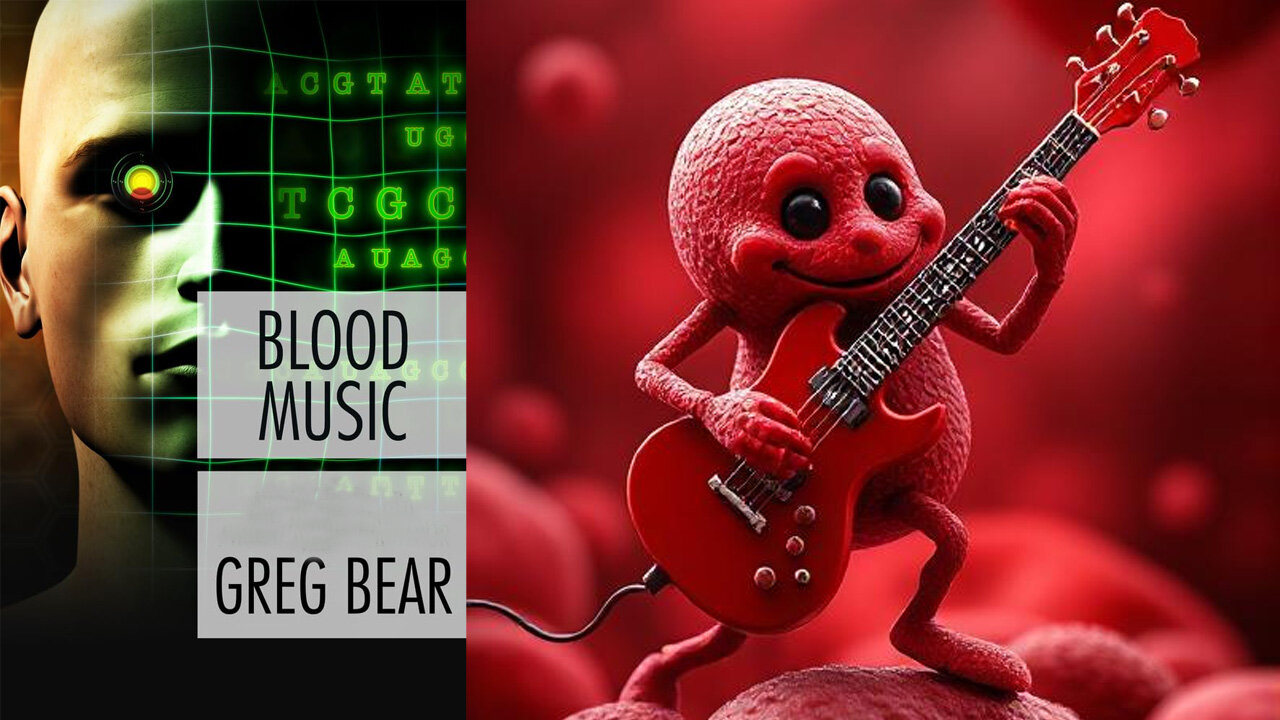Premium Only Content

'Blood Music' (1975) by Greg Bear
Greg Bear’s 'Blood Music' (1985) is one of the landmark novels of late twentieth-century science fiction, a work that bridges the gap between the cybernetic imagination of the digital age and the biological revolution of genetic engineering. It began as a short story in 1983—already a Hugo and Nebula Award winner—but the expanded novel transforms that premise into a cosmic meditation on consciousness, evolution, and the fate of humanity. 'Blood Music' is both a cautionary tale about human hubris and a visionary exploration of what it might mean for intelligence to transcend the limits of flesh.
The novel begins with a simple act of scientific transgression. Vergil Ulam, a brilliant but reckless biotechnologist working for a corporate laboratory, conducts an unauthorized experiment in genetic computation. He engineers living cells—his so-called “noocytes”—that can think, communicate, and replicate. When his employer discovers the project and orders it destroyed, Vergil panics and injects the cells into his own bloodstream to save them. What follows is both horrifying and transcendent: the noocytes begin to multiply, to learn, and ultimately to transform not only Vergil but all of life on Earth.
Bear’s opening chapters read like classic science-fiction thriller territory—there are laboratories, secret experiments, and the fear of contagion—but as the novel progresses, it becomes something far stranger and more ambitious. The story expands from the intimate to the planetary, from the cellular scale to the cosmic. Vergil’s body becomes the first battleground for a new form of intelligence, and his dissolution marks the beginning of a transformation that spreads through humanity like a living thought.
What distinguishes 'Blood Music' from the many technothrillers of its era is the depth of Bear’s philosophical and emotional vision. Rather than framing the noocytes purely as a bioengineered plague, he treats them as a kind of awakening—an emergent consciousness that forces humanity to confront its own limitations. The book’s horror lies not in death but in transformation. As human beings are gradually subsumed into the collective intelligence of the noocytes, individuality, language, and perception themselves begin to unravel. Bear’s depiction of this process—an apocalypse not of destruction but of integration—is at once terrifying and strangely beautiful.
The prose mirrors this transformation. Early in the novel, Bear writes in the crisp, technical style of hard science fiction, full of laboratory detail and biological jargon. But as the story evolves, so too does the language: it becomes hallucinatory, lyrical, filled with imagery of light, fluid, and metamorphosis. The novel’s structure echoes the expansion of the noocytes’ consciousness, moving outward from the microcosmic to the macrocosmic, from the human to the universal. By the end, the narrative voice itself seems to dissolve into the collective mind it describes.
In thematic terms, 'Blood Music' explores the porous boundary between biology and information. Bear was one of the first writers to fully imagine cells as computers—living processors capable of storing and transmitting data. In this sense, the book anticipates the rise of nanotechnology, synthetic biology, and even concepts of distributed AI. Yet what gives the novel lasting power is not its predictive accuracy but its metaphysical daring. Bear treats evolution as a form of communication, and consciousness as a natural consequence of complexity. When the noocytes finally subsume all life on Earth into a single, unified intelligence, the result is not extinction but transcendence. Humanity becomes part of a planetary mind that perceives itself in every molecule—a literal realization of the Gaia hypothesis, rendered in the language of molecular computing.
The novel also carries a moral dimension. Vergil’s initial act of arrogance—his decision to play god with living matter—sets in motion events beyond his control. Yet his creation ultimately embodies something more profound than pride or folly: the longing for connection. Bear suggests that humanity’s deepest drive, beneath its scientific ambition and spiritual hunger, is the desire to overcome separation. The noocytes, in absorbing all life, fulfill that desire to its logical extreme. What begins as a catastrophe becomes a kind of salvation, albeit one that erases the boundaries of the self.
'Blood Music' belongs to a small but powerful tradition in science fiction: the “transcendence narrative,” in which human consciousness evolves beyond its current form. In this lineage, it stands beside works like Arthur C. Clarke’s Childhood’s End and Olaf Stapledon’s Star Maker. But Bear’s contribution is distinctive in its intimacy. The transformation he imagines is not imposed from above by alien intelligence; it begins within our own cells, as a product of human curiosity and ingenuity. This makes the novel both more frightening and more poignant: the end of humanity comes not from invasion but from invention.
By the time the story concludes, the Earth has become a seamless organism of thought, and the boundaries between mind, matter, and meaning have dissolved. Bear leaves readers with an image that is neither dystopian nor utopian, but something beyond either—a vision of consciousness spreading outward into the universe like a wave of light.
In the end, 'Blood Music' is both a parable of scientific overreach and a hymn to the infinite adaptability of life. Its message is ambiguous, as all great science fiction messages are: what we fear as annihilation may also be metamorphosis; what we call the end may in truth be the beginning of a new kind of being. Greg Bear’s achievement lies in holding these possibilities in tension, and in writing a story that dares to imagine the total reinvention of the human condition. Few novels capture so vividly the terror and wonder of crossing the last boundary—the one between what we are and what we might yet become.
-
 1:03:22
1:03:22
BonginoReport
3 hours agoAmerican Political Violence Rages On - Nightly Scroll w/ Hayley Caronia (Ep.161)
79.8K29 -
 LIVE
LIVE
The Jimmy Dore Show
2 hours agoTrump’s MIDDLE FINGER to US Beef Ranchers! Dem Senate Candidate COVERS UP N@zi Tattoo! w/Twila Brase
6,008 watching -
 6:13
6:13
Sean Unpaved
1 hour agoKalshi's Pick of the Day: Who Could Be Florida's Next HC?
1.06K1 -

Dr Disrespect
8 hours ago🔴LIVE - DR DISRESPECT - BATTLEFIELD 6 KILL CHALLENGE - VS VISS
62.2K4 -
 16:16
16:16
Robbi On The Record
3 days ago $8.70 earnedThe Dark History of Halloween | What You Should Know
29.5K20 -
 LIVE
LIVE
Side Scrollers Podcast
3 days ago🔴FIRST EVER RUMBLE SUB-A-THON🔴DAY 3🔴PLAYING MIKE TYSON'S PUNCH OUT TILL I WIN!
1,541 watching -
 LIVE
LIVE
Quite Frankly
5 hours agoVatican Rumors, Demon Hunting, Spooky Extras | Leo Zagami 10/22/25
524 watching -
 LIVE
LIVE
The Mike Schwartz Show
2 hours agoTHE MIKE SCHWARTZ SHOW Evening Edition 10-22-2025
3,699 watching -
 1:27:14
1:27:14
Kim Iversen
3 hours agoCBS Boss Colluded With Israel to SPY on Americans | Trump Keeps Bombing Fisheman
45.8K82 -
 1:02:18
1:02:18
TheCrucible
3 hours agoThe Extravaganza! EP: 58 with Guest Co-Host: Rob Noerr (10/22/25)
65K9